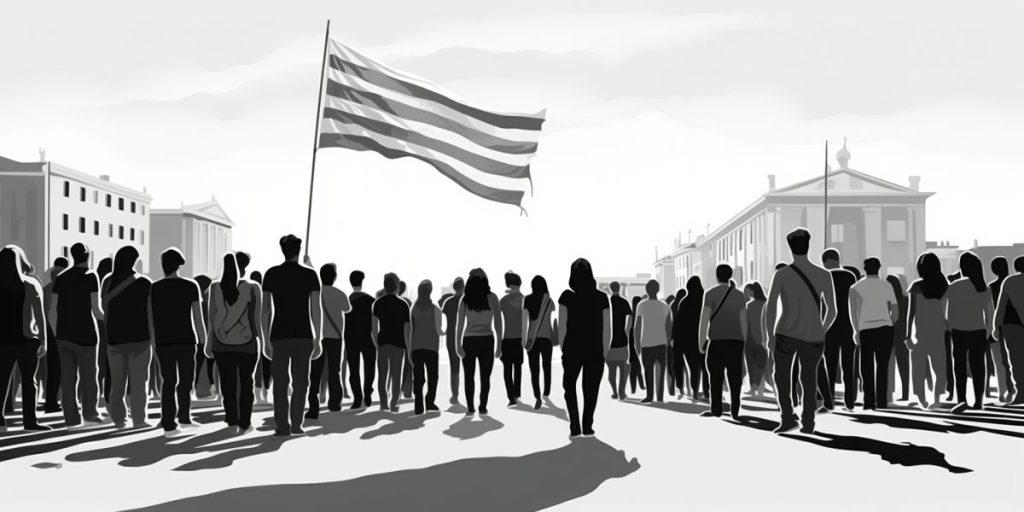Approximately 15 to 20 Greek Cypriot students were arrested for protesting outside the Turkish embassy during President Erdogan’s visit to Athens. The students, linked to the nationalist group Drasis-Kes, opposed Erdogan’s presence, leading to heightened security measures and a temporary ban on public gatherings.
Why were Greek Cypriots arrested during Erdogan’s visit to Athens?
During Turkish President Tayyip Erdogan’s visit to Athens, approximately 15 to 20 Greek Cypriot students were arrested for protesting outside the Turkish embassy. The students, linked to the nationalist far-right group Drasis-Kes, opposed Erdogan’s presence, resulting in heightened security and a temporary ban on public gatherings to ensure order and safety.
Tensions in Athens Amid Erdogan’s Visit
On a tense Thursday in Athens, the air was thick with dissent as Greek Cypriot students took to the streets. The group, identified as members of the nationalist far-right student organization Drasis-Kes, made headlines as they voiced their strong opposition to Turkish President Tayyip Erdogan’s presence in the Greek capital. The demonstration, staged outside the Turkish embassy, coincided with Erdogan’s highly secured visit, drawing not only media attention but also a stringent police response.
The police reported the arrest of approximately 15 to 20 Greek Cypriot students during the protest. In a similar vein, ten Kurdish protesters found themselves in custody. Security measures were heightened to their peak as outdoor gatherings were prohibited by the authorities until Erdogan’s scheduled departure at 6pm. Amidst the chaos, the protesters managed to display a poignant banner that sent a clear message: “Erdogan, we will fight until the last Turk is out of Cyprus.”
Unrest Over Police Actions
The scene outside the Turkish embassy was one of contention and strong political statements. Among the voices raised were those of the organization involved and the extreme-right party Elam. Both entities publicly denounced the Greek police’s handling of the protests, describing their actions as unacceptable and worthy of condemnation. This incident is not an isolated one and reflects the long-standing tensions between Greece and Turkey, particularly over the divided island of Cyprus.
Protests such as these are indicative of the underlying historical and political complexities that mar Greece-Turkey relations. The island of Cyprus has been divided since 1974, with the northern part occupied by Turkish forces. This division has led to numerous diplomatic stand-offs and a persistent quest for reunification talks, which have yet to yield a lasting solution.
Security in Focus During Presidential Visit
The Greek government was on high alert during Erdogan’s visit, implementing stringent security protocols to prevent any untoward incidents. This heightened security is a standard procedure during visits of such high-profile international figures and is indicative of the delicate nature of Erdogan’s first visit to Greece as president. The ban on public gatherings was a precautionary measure aimed at maintaining order and ensuring the safety of both the visiting delegation and the public.
The police force was deployed in numbers to manage the crowd and prevent any escalation of the protests. While the intentions of the security measures were to maintain peace, the resultant arrests and suppression of the protest have sparked a debate on the balance between security and the right to peaceful assembly and expression.
Agricultural Concerns Amid Sociopolitical Unrest
In a related note, separate from the diplomatic tensions, Greek olive growers are facing their own set of challenges as olive theft has become increasingly prevalent. The valuable crop has been targeted by thieves, causing concern among farmers who are bracing for potential losses. This issue feeds into a broader narrative of economic and social challenges that Greece continues to grapple with, alongside the more visible political dramas that unfold on the international stage.
Olive cultivation is a significant part of the Greek economy and cultural heritage. With the rise in thefts, farmers are urging authorities to take stronger measures to protect their livelihoods. This development serves as a reminder that, even amid high-level political tensions, everyday struggles and concerns persist for the citizens of Greece.
Why were Greek Cypriots arrested during Erdogan’s visit to Athens?
During Turkish President Tayyip Erdogan’s visit to Athens, approximately 15 to 20 Greek Cypriot students were arrested for protesting outside the Turkish embassy. The students, linked to the nationalist far-right group Drasis-Kes, opposed Erdogan’s presence, resulting in heightened security and a temporary ban on public gatherings to ensure order and safety.
What were the tensions in Athens during Erdogan’s visit?
Greek Cypriot students belonging to the nationalist far-right organization Drasis-Kes protested outside the Turkish embassy during Erdogan’s visit to Athens. This led to heightened tensions, strict security measures, and a temporary ban on public gatherings. The protest coincided with Erdogan’s highly secured visit and drew media attention.
Why did the Greek police face criticism for their actions during the protests?
The Greek police faced criticism from the organization involved in the protests and the extreme-right party Elam for their handling of the demonstrations. Both entities deemed their actions unacceptable and deserving of condemnation. This incident reflects the long-standing tensions between Greece and Turkey, particularly regarding the divided island of Cyprus.
What security measures were implemented during Erdogan’s visit?
The Greek government implemented stringent security protocols during Erdogan’s visit to ensure the safety of both the visiting delegation and the public. This included a temporary ban on public gatherings, a high police presence to manage the crowd, and preventive measures to maintain order. The aim was to prevent any untoward incidents and maintain peace, although the arrests and suppression of the protest sparked a debate on the balance between security and the right to peaceful assembly and expression.

